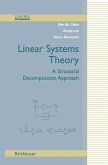Tadeusz Kaczorek
Positive 1d and 2D Systems
Tadeusz Kaczorek
Positive 1d and 2D Systems
- Gebundenes Buch
- Merkliste
- Auf die Merkliste
- Bewerten Bewerten
- Teilen
- Produkt teilen
- Produkterinnerung
- Produkterinnerung
Moving on from earlier stochastic and robust control paradigms, this book introduces the reader to the fundamentals of probabilistic methods in the analysis and design of uncertain systems. It significantly reduces the computational cost of high-quality control and the complexity of the algorithms involved.
Andere Kunden interessierten sich auch für
![Positive 1D and 2D Systems Positive 1D and 2D Systems]() Tadeusz KaczorekPositive 1D and 2D Systems42,99 €
Tadeusz KaczorekPositive 1D and 2D Systems42,99 €![Randomized Algorithms for Analysis and Control of Uncertain Systems Randomized Algorithms for Analysis and Control of Uncertain Systems]() Roberto TempoRandomized Algorithms for Analysis and Control of Uncertain Systems121,99 €
Roberto TempoRandomized Algorithms for Analysis and Control of Uncertain Systems121,99 €![Switched Linear Systems Switched Linear Systems]() Zhendong SunSwitched Linear Systems121,99 €
Zhendong SunSwitched Linear Systems121,99 €![Polynomial and Rational Matrices Polynomial and Rational Matrices]() Tadeusz KaczorekPolynomial and Rational Matrices161,99 €
Tadeusz KaczorekPolynomial and Rational Matrices161,99 €![Linear Systems Theory Linear Systems Theory]() Ben M. ChenLinear Systems Theory42,99 €
Ben M. ChenLinear Systems Theory42,99 €![Subspace Methods for System Identification Subspace Methods for System Identification]() Tohru KatayamaSubspace Methods for System Identification191,99 €
Tohru KatayamaSubspace Methods for System Identification191,99 €![A Linear Systems Primer A Linear Systems Primer]() Panos J AntsaklisA Linear Systems Primer73,99 €
Panos J AntsaklisA Linear Systems Primer73,99 €-
-
-
Moving on from earlier stochastic and robust control paradigms, this book introduces the reader to the fundamentals of probabilistic methods in the analysis and design of uncertain systems. It significantly reduces the computational cost of high-quality control and the complexity of the algorithms involved.
Hinweis: Dieser Artikel kann nur an eine deutsche Lieferadresse ausgeliefert werden.
Hinweis: Dieser Artikel kann nur an eine deutsche Lieferadresse ausgeliefert werden.
Produktdetails
- Produktdetails
- Communications and Control Engineering
- Verlag: Springer, Berlin
- Seitenzahl: 448
- Erscheinungstermin: 25. Oktober 2001
- Englisch
- Abmessung: 241mm x 160mm x 30mm
- Gewicht: 806g
- ISBN-13: 9781852335083
- ISBN-10: 1852335084
- Artikelnr.: 10215227
- Herstellerkennzeichnung
- Libri GmbH
- Europaallee 1
- 36244 Bad Hersfeld
- gpsr@libri.de
- Communications and Control Engineering
- Verlag: Springer, Berlin
- Seitenzahl: 448
- Erscheinungstermin: 25. Oktober 2001
- Englisch
- Abmessung: 241mm x 160mm x 30mm
- Gewicht: 806g
- ISBN-13: 9781852335083
- ISBN-10: 1852335084
- Artikelnr.: 10215227
- Herstellerkennzeichnung
- Libri GmbH
- Europaallee 1
- 36244 Bad Hersfeld
- gpsr@libri.de
Tadeusz Kaczorek, Warsaw University of Technology, Warsaw, Poland
Elements of Probability Theory
Uncertain Linear Systems and Robustness
Linear Robust Control Design
Some Limits of the Robustness Paradigm
Probabilistic Methods for Robustness
Monte Carlo Methods
Randomized Algorithms in Systems and Control
Probability Inequalities
Statistical Learning Theory and Control Design
Sequential Algorithms for Probabilistic Robust Design
Sequential Algorithms for LPV Systems
Scenario Approach for Probabilistic Robust Design
Random Number and Variate Generation
Statistical Theory of Radial Random Vectors
Vector Randomization Methods
Statistical Theory of Radial Random Matrices
Matrix Randomization Methods
Applications of Randomized Algorithms
Uncertain Linear Systems and Robustness
Linear Robust Control Design
Some Limits of the Robustness Paradigm
Probabilistic Methods for Robustness
Monte Carlo Methods
Randomized Algorithms in Systems and Control
Probability Inequalities
Statistical Learning Theory and Control Design
Sequential Algorithms for Probabilistic Robust Design
Sequential Algorithms for LPV Systems
Scenario Approach for Probabilistic Robust Design
Random Number and Variate Generation
Statistical Theory of Radial Random Vectors
Vector Randomization Methods
Statistical Theory of Radial Random Matrices
Matrix Randomization Methods
Applications of Randomized Algorithms
1. Positive matrices and graphs.- 1.1 Generalised permutation matrix, nonnegative matrix, positive and strictly positive matrices.- 1.2 Reducible and irreducible matrices.- 1.3 The Collatz - Wielandt function.- 1.4 Maximum eigenvalue of a nonnegative matrix.- 1.5 Bounds on the maximal eigenvalue and eigenvector of a positive matrix.- 1.6 Dominating positive matrices of complex matrices.- 1.7 Oscillatory and primitive matrices.- 1.8 The canonical Frobenius form of a cyclic matrix.- 1.9 Metzler matrix.- 1.10 M-matrices.- 1.11 Totally nonnegative (positive) matrices.- 1.12 Graphs of positive systems.- 1.13 Graphs of reducible, irreducible, cyclic and primitive systems.- Problems.- References.- 2. Continuous-ime and discrete-ime positive systems.- 2.1 Externally positive systems.- 2.2 Internally positive systemst.- 2.3 Compartmental systems.- 2.4 Stability of positive systems.- 2.5 Input-output stability.- 2.6 Weakly positive systems.- 2.7 Componentwise asymptotic stability and exponental stability of positive systems.- 2.8 Externally and internally positive singular systems.- 2.9 Composite positive linear systems.- 2.10 Eigenvalue assignment problem for positive linear systems.- Problems.- References.- 3. Reachability, controllability and observability of positive systems.- 3.1 discrete-time systems.- 3.2 continuous-time systems.- 3.3 Controllability of positive systems.- 3.4 Minimum energy control of positive systems.- 3.5 Reachability and controllability of weakly positive systems with state feedbacks.- 3.6 Observability of discrete-time positive systems.- 3.7 Reachability and controllability of weakly positive systems.- Problems.- References.- 4. Realisation problem of positive 1D systems.- 4.1 Basic notions and formulation of realisation problem.- 4.2 Existence andcomputation of positive realisations.- 4.3 Existence and computation of positive realisations of multi-input multi-output systems.- 4.4 Existence and computation of positive realisations of weakly positive multi-input multi-output systems.- 4.5 Positive realisations in canonical forms of singular linear.- Problems.- References.- 5. 2D models of positive linear systems.- 5.1 Internally positive Roesser model.- 5.2 Externally positive Roesser model.- 5.3 Internally positive general model.- 5.4 Externally positive general model.- 5.5 Positive Fornasini-Marchesini models and relationships between models.- 5.6 Positive models of continuous-discrete systems.- 5.7 Positive generalised Roesser model.- Problems.- References.- 6 Controllability and minimum energy control of positive 2D systems.- 6.1 Reachability, controllability and observability of positive Roesser model.- 6.2 Reachability, controllability and observability of the positive general model.- 6.3 Minimum energy control of positive 2D systems.- 6.4 Reachability and minimum energy control of positive 2D continuous-discrete systems.- Problems.- References.- 7. Realisation problem for positive 2D systems.- 7.1 Formulation of realisation problem for positive Roesser model.- 7.2 Existence of positive realisations.- 7.3 Positive realisations in canonical form of the Roesser model.- 7.4 Determination of the positive Roesser model by the use of state variables diagram.- 7.5 Determination of a positive 2D general model for a given transfer matrix.- 7.6 Positive realisation problem for singular 2D Roesser model.- 7.7 Concluding remarks and open problems.- Problems.- References.- Appendix A Oeterminantal Sylvester equality.- Appendix B Computation of fundamental matrices of linear systems.- Appendix C Solutions of 20 linear discrete models.- Appendix D Transformations of matrices to their canonical forms and lemmas for 1D singular systems.
Elements of Probability Theory
Uncertain Linear Systems and Robustness
Linear Robust Control Design
Some Limits of the Robustness Paradigm
Probabilistic Methods for Robustness
Monte Carlo Methods
Randomized Algorithms in Systems and Control
Probability Inequalities
Statistical Learning Theory and Control Design
Sequential Algorithms for Probabilistic Robust Design
Sequential Algorithms for LPV Systems
Scenario Approach for Probabilistic Robust Design
Random Number and Variate Generation
Statistical Theory of Radial Random Vectors
Vector Randomization Methods
Statistical Theory of Radial Random Matrices
Matrix Randomization Methods
Applications of Randomized Algorithms
Uncertain Linear Systems and Robustness
Linear Robust Control Design
Some Limits of the Robustness Paradigm
Probabilistic Methods for Robustness
Monte Carlo Methods
Randomized Algorithms in Systems and Control
Probability Inequalities
Statistical Learning Theory and Control Design
Sequential Algorithms for Probabilistic Robust Design
Sequential Algorithms for LPV Systems
Scenario Approach for Probabilistic Robust Design
Random Number and Variate Generation
Statistical Theory of Radial Random Vectors
Vector Randomization Methods
Statistical Theory of Radial Random Matrices
Matrix Randomization Methods
Applications of Randomized Algorithms
1. Positive matrices and graphs.- 1.1 Generalised permutation matrix, nonnegative matrix, positive and strictly positive matrices.- 1.2 Reducible and irreducible matrices.- 1.3 The Collatz - Wielandt function.- 1.4 Maximum eigenvalue of a nonnegative matrix.- 1.5 Bounds on the maximal eigenvalue and eigenvector of a positive matrix.- 1.6 Dominating positive matrices of complex matrices.- 1.7 Oscillatory and primitive matrices.- 1.8 The canonical Frobenius form of a cyclic matrix.- 1.9 Metzler matrix.- 1.10 M-matrices.- 1.11 Totally nonnegative (positive) matrices.- 1.12 Graphs of positive systems.- 1.13 Graphs of reducible, irreducible, cyclic and primitive systems.- Problems.- References.- 2. Continuous-ime and discrete-ime positive systems.- 2.1 Externally positive systems.- 2.2 Internally positive systemst.- 2.3 Compartmental systems.- 2.4 Stability of positive systems.- 2.5 Input-output stability.- 2.6 Weakly positive systems.- 2.7 Componentwise asymptotic stability and exponental stability of positive systems.- 2.8 Externally and internally positive singular systems.- 2.9 Composite positive linear systems.- 2.10 Eigenvalue assignment problem for positive linear systems.- Problems.- References.- 3. Reachability, controllability and observability of positive systems.- 3.1 discrete-time systems.- 3.2 continuous-time systems.- 3.3 Controllability of positive systems.- 3.4 Minimum energy control of positive systems.- 3.5 Reachability and controllability of weakly positive systems with state feedbacks.- 3.6 Observability of discrete-time positive systems.- 3.7 Reachability and controllability of weakly positive systems.- Problems.- References.- 4. Realisation problem of positive 1D systems.- 4.1 Basic notions and formulation of realisation problem.- 4.2 Existence andcomputation of positive realisations.- 4.3 Existence and computation of positive realisations of multi-input multi-output systems.- 4.4 Existence and computation of positive realisations of weakly positive multi-input multi-output systems.- 4.5 Positive realisations in canonical forms of singular linear.- Problems.- References.- 5. 2D models of positive linear systems.- 5.1 Internally positive Roesser model.- 5.2 Externally positive Roesser model.- 5.3 Internally positive general model.- 5.4 Externally positive general model.- 5.5 Positive Fornasini-Marchesini models and relationships between models.- 5.6 Positive models of continuous-discrete systems.- 5.7 Positive generalised Roesser model.- Problems.- References.- 6 Controllability and minimum energy control of positive 2D systems.- 6.1 Reachability, controllability and observability of positive Roesser model.- 6.2 Reachability, controllability and observability of the positive general model.- 6.3 Minimum energy control of positive 2D systems.- 6.4 Reachability and minimum energy control of positive 2D continuous-discrete systems.- Problems.- References.- 7. Realisation problem for positive 2D systems.- 7.1 Formulation of realisation problem for positive Roesser model.- 7.2 Existence of positive realisations.- 7.3 Positive realisations in canonical form of the Roesser model.- 7.4 Determination of the positive Roesser model by the use of state variables diagram.- 7.5 Determination of a positive 2D general model for a given transfer matrix.- 7.6 Positive realisation problem for singular 2D Roesser model.- 7.7 Concluding remarks and open problems.- Problems.- References.- Appendix A Oeterminantal Sylvester equality.- Appendix B Computation of fundamental matrices of linear systems.- Appendix C Solutions of 20 linear discrete models.- Appendix D Transformations of matrices to their canonical forms and lemmas for 1D singular systems.








